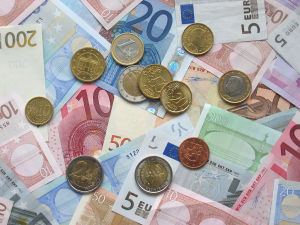Economic Collapse Approaches; German Bank Charging Customers Negative Interest
By J. D. Heyes | NaturalNews
German bank begins charging customers negative interest as economic collapse approaches. Save and prepare prudently, America.
(NaturalNews) In a sane world, developed countries consider financial debt to be a bad thing, especially when it comes to consumer debt, because overwhelming consumer debt is bad when governments are trying to grow their economies.
Growing economies solve a lot of problems for government officials and elected leaders — growing economies provide governments with funding so the government can do the things that its citizens expect it to do: defend them, provide basic infrastructure and perform other services endemic to a modern society.

Wait — doesn’t that merely worsen the country’s economic situation by growing its debt? Sure, but the practice works for a little while. It allows government leaders to kick the can down the road, so that future government leaders will have to deal with the country’s financial problems and its ever-growing debt.
Growing debt only worsens an economy
Except that, eventually, the country can’t borrow any more. At that time, whoever is in charge has to deal with far fewer options to solve the debt problem. And leaders put in such positions tend to get desperate; they adopt desperate measures that often hurt the very people whom they were elected or appointed to serve, though the people had very little to do with the policies that led to the country’s financial dire straits to begin with.
Am I talking about America? I certainly could be; America, with a $17 trillion-plus national debt and over $100 trillion in future (unfunded) liabilities, is well on its way to a day of economic reckoning. But so, too, are many of the countries of Europe, including one of its “wealthiest” nations: Germany.
For decades, most of Europe’s democracies have experimented with economic socialism, which is nothing short of massive wealth redistribution (think Barack Obama’s “Obamacare” and the Dodd-Frank Act, which is currently transferring tens of billions in taxpayer dollars to the country’s biggest banks). And now, after taking all they can from their people and over-promising benefits, the global economic downturn of 2007-2008 has left them scrambling for ways to pay those promised benefits.
Some countries have simply been unable to do so. One of them is Greece, whose economy nearly collapsed, save for massive austerity measures taken a couple of years ago. The government of Cyprus, which is currently wading through a similar economic morass, robbed the bank accounts of its citizens to help stave off bankruptcy.
Germany, much more wealthy than those two countries, is nonetheless experiencing economic doldrums as well. And now, a bank in Deutschland has implemented a negative interest rate of 0.25 percent for its richest clients, reports WolfStreet.com:
Retail and business customers with over €500,000 on deposit as of November 1 will earn a “negative interest rate” of 0.25%. In less euphemistic terms, they have to pay 0.25% per annum to the bank for the privilege of handing the bank their hard-earned money or their business cash.
‘No political will to reform’
That means, according to some analysts, that the central planners must see the gathering of economic storm clouds quickening on the horizon; when a bank (admittedly not Germany’s biggest bank) has to resort to imposing a fee on its depositors for the “privilege” of depositing there, something is very economically amiss. Germans are calling it “punishment interest.”
Sources:
